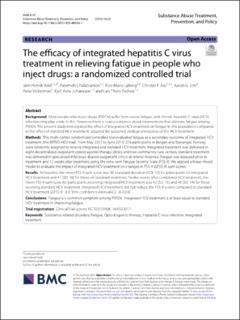| dc.contributor.author | Vold, Jørn Henrik | |
| dc.contributor.author | Chalabianloo, Fatemeh | |
| dc.contributor.author | Løberg, Else-Marie | |
| dc.contributor.author | Aas, Christer Frode | |
| dc.contributor.author | Lim, Aaron G. | |
| dc.contributor.author | Vickerman, Peter | |
| dc.contributor.author | Johansson, Kjell Arne | |
| dc.contributor.author | Fadnes, Lars T. | |
| dc.date.accessioned | 2024-04-18T11:38:23Z | |
| dc.date.available | 2024-04-18T11:38:23Z | |
| dc.date.created | 2023-06-21T13:33:07Z | |
| dc.date.issued | 2023 | |
| dc.identifier.issn | 1747-597X | |
| dc.identifier.uri | https://hdl.handle.net/11250/3127233 | |
| dc.description.abstract | Background
Most people who inject drugs (PWIDs) suffer from severe fatigue, and chronic hepatitis C virus (HCV) infection may play a role in this. However, there is scarce evidence about interventions that alleviate fatigue among PWIDs. The present study investigated the effect of integrated HCV treatment on fatigue in this population compared to the effect of standard HCV treatment, adjusted for sustained virological response of the HCV treatment.
Methods
This multi-center, randomized controlled trial evaluated fatigue as a secondary outcome of integrated HCV treatment (the INTRO-HCV trial). From May 2017 to June 2019, 276 participants in Bergen and Stavanger, Norway, were randomly assigned to receive integrated and standard HCV treatment. Integrated treatment was delivered in eight decentralized outpatient opioid agonist therapy clinics and two community care centers; standard treatment was delivered in specialized infectious disease outpatient clinics at referral hospitals. Fatigue was assessed prior to treatment and 12 weeks after treatment using the nine-item Fatigue Severity Scale (FSS-9). We applied a linear mixed model to evaluate the impact of integrated HCV treatment on changes in FSS-9 (ΔFSS-9) sum scores.
Results
At baseline, the mean FSS-9 sum score was 46 (standard deviation (SD): 15) for participants on integrated HCV treatment and 41 (SD: 16) for those on standard treatment. Twelve weeks after completed HCV treatment, the mean FSS-9 sum score for participants receiving integrated HCV treatment was 42 (SD: 15) and 40 (SD: 14) for those receiving standard HCV treatment. Integrated HCV treatment did not reduce the FSS-9 scores compared to standard HCV treatment (ΔFSS-9: -3.0, 95% confidence interval (CI): -6.4;0.4).
Conclusions
Fatigue is a common symptom among PWIDs. Integrated HCV treatment is at least equal to standard HCV treatment in improving fatigue. | en_US |
| dc.language.iso | eng | en_US |
| dc.publisher | BMC | en_US |
| dc.rights | Navngivelse 4.0 Internasjonal | * |
| dc.rights.uri | http://creativecommons.org/licenses/by/4.0/deed.no | * |
| dc.title | The efficacy of integrated hepatitis C virus treatment in relieving fatigue in people who inject drugs: a randomized controlled trial | en_US |
| dc.type | Journal article | en_US |
| dc.type | Peer reviewed | en_US |
| dc.description.version | publishedVersion | en_US |
| dc.rights.holder | Copyright 2023 The Author(s) | en_US |
| dc.source.articlenumber | 25 | en_US |
| cristin.ispublished | true | |
| cristin.fulltext | original | |
| cristin.qualitycode | 1 | |
| dc.identifier.doi | 10.1186/s13011-023-00534-1 | |
| dc.identifier.cristin | 2156618 | |
| dc.source.journal | Substance Abuse Treatment, Prevention, and Policy | en_US |
| dc.identifier.citation | Substance Abuse Treatment, Prevention, and Policy. 2023, 18 (1), 25. | en_US |
| dc.source.volume | 18 | en_US |
| dc.source.issue | 1 | en_US |

